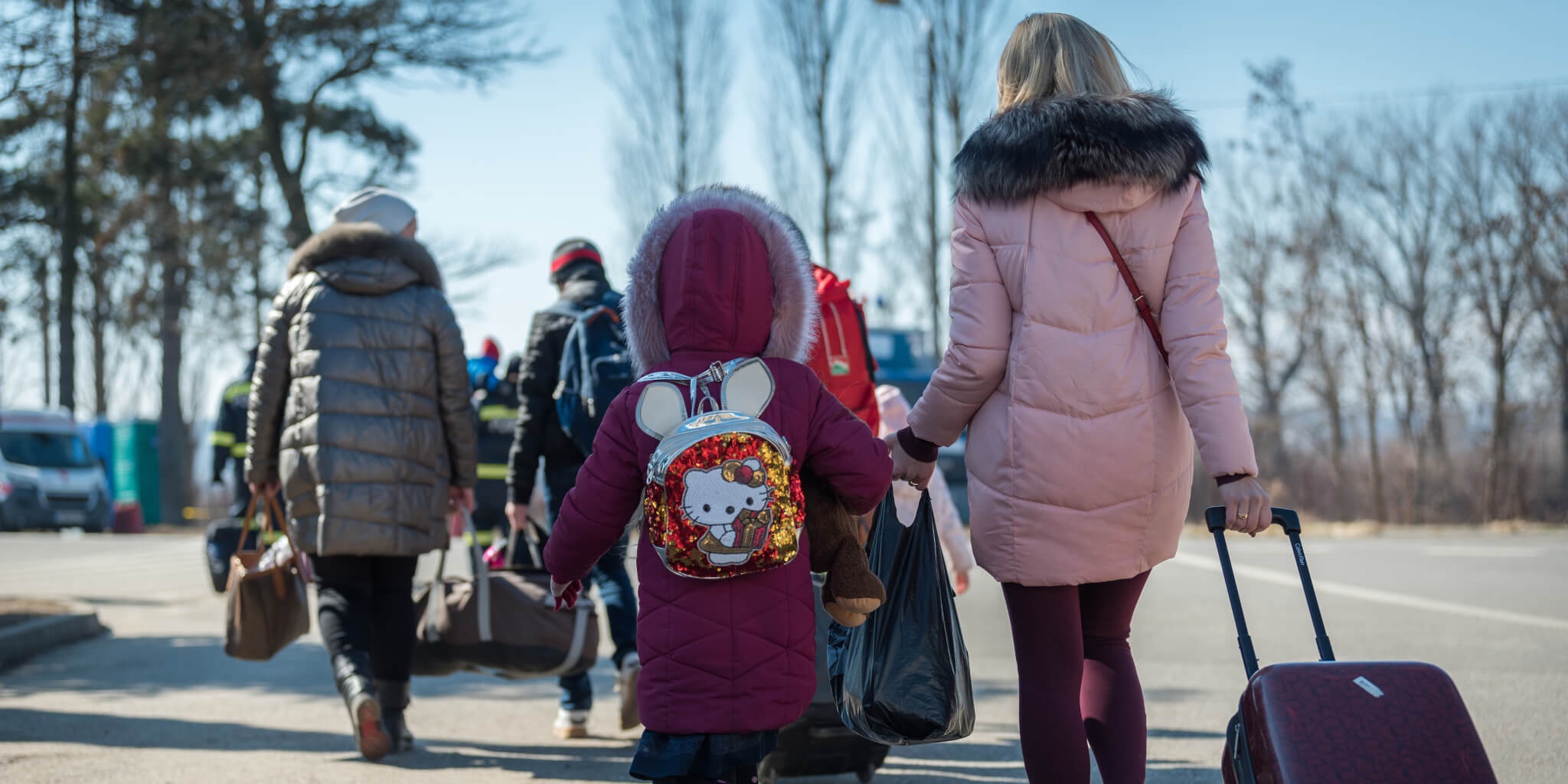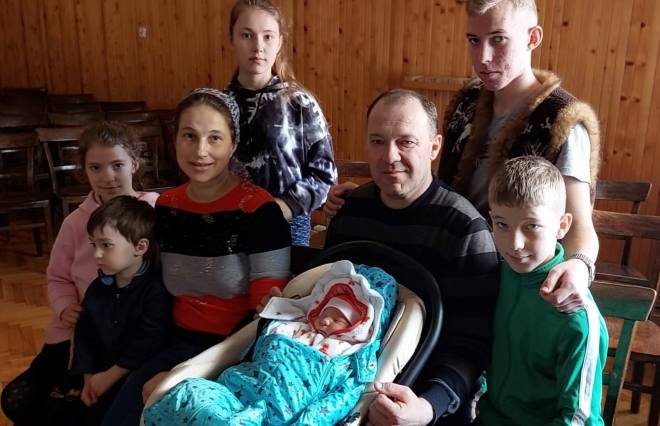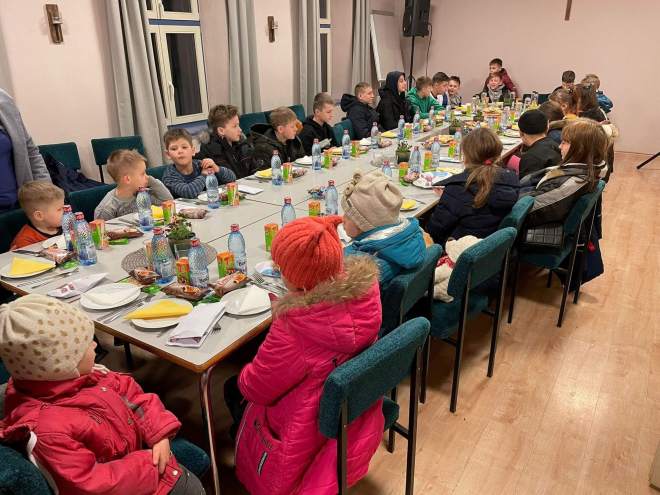Help and hope on the journey from Ukraine

A refugee family from Ukraine arrives at the Vama Siret border crossing, Romania. The crossing connects Romania with the Ukrainian village of Terebleche. PHOTO: ALBIN HILLERT, ACT
UMCOR supports United Methodists in Europe as they welcome refugees from Ukraine into their homes and houses of worship.
By Christie R. House
March 28, 2022 | ATLANTA
The number of refugees from Ukraine seeking safety continues to increase. As the Central and Southern European UMC communicators describe it: “These are not simply ‘streams’ or ‘waves.’ They are an unimaginable number of individuals, each with their own identity and history, who have set out to seek protection and refuge in a safe place.”
A safe place of welcome greeted a family from Ukraine with an infant, born en route after they crossed the border into Poland. Two days later, they arrived in Warsaw, where they were taken in by the United Methodist church there. The church’s pastor reported to the episcopal office that the parents named the newborn Miroslava – “the peace-loving one.”

Stories like this emerge every day in European countries bordering Ukraine. The United Nations High Commissioner for Refugees (UNHCR) estimates 3.7 million Ukrainians have fled as refugees into neighboring countries, an overwhelming number of which are women and children. Of these, more than 2 million have taken refuge in Poland and more than half a million in Romania. There is less certainty in the West about how many Ukrainians have crossed into Belarus or the Russian Federation and what happens to them after they leave Ukraine.
A congregant response
Response to the war in Ukraine has pulled together networks of churches and nongovernmental (NGO) and local civic organizations in new ways. The Central and Southern Europe Episcopal Area funded locally hired coordinators to help with some of the humanitarian and resettlement activities of Methodist churches in various countries. UMCOR sent relief grants to the Central and Southern Europe office for churches offering help to refugees in Slovakia, Poland, Romania and Hungary.
The UMC in Romania, though small in size, has taken a leading role in welcoming and situating refugees. Cooperating with other faith communities and with NGOs, the church has hosted guests from Ukraine, many of whom are passing through to relatives who live further West. But for those who have no relatives waiting, United Methodists have found space with other churches and organizations for long-term placements. They’ve worked with local restaurants to provide meals for their guests and taken several loads of food and supplies to Ukraine as well.
UMCOR will help with the church’s latest project to hire a psychologist and a lawyer, both Ukrainian, to assist refugees with trauma and resettlement. UMCOR will also help to increase the capacity of the Romanian UMC to provide housing, food, psychosocial assistance, as well as community building and social integration.
Two long-time UMCOR partners, ACT Alliance (Geneva) and the International Orthodox Christian Charities (IOCC), have received or are in negotiation to receive major UMCOR support for a variety of efforts. UMCOR is working to provide safe spaces for women and children, safe and reliable transportation, and dissemination of information to help women and children recognize and avoid situations that expose them to abuse and trafficking.
“[Our partnership with ACT] represents our faith in the power of collaborating with other church bodies to collectively address crises in the world,” noted the Rev. Jack Amick, who directs UMCOR’s Global Migration program. “After much discussion with the ACT Europe Forum Convenor, we concluded that the best use of our contribution would be to support enhanced protection measures for a refugee population of over 3 million, which consists primarily of women and children.”
United Methodists in Sibiu, Romania, can attest to the importance of this kind of support. This story comes from the Rev. Cristian Istrate, whose UMC congregation raised funds to help a small orphanage in Kyiv, Ukraine, travel with children across the border into Romania earlier in March. His church prepared space and was ready to welcome them. The pastor received word that the van carrying the children, the director and two other adults had crossed the border.

However, at that point, they were handed over to another driver, one who had not been vetted. He refused to continue the trip to Sibiu and instead, headed back toward Ukraine. The Methodists, worried when the van did not arrive, called the Romanian authorities, who said the driver stated he was handing the children over to another person who would take them to Italy.
The church in Sibiu alerted the Ukrainian consulate in Romania, which arranged for the van to be stopped before it left Romania. There was nothing the adults traveling with the children could do, and by the time they reached their hosts in Sibiu, 48 hours later, the women were greatly traumatized. But they reached safety and have been cared for by this congregation and their supporters. In the evil and upheaval of war, those who mean harm also congregate, but that is why the broader actions taken by UMCOR, IOCC and ACT are so important.
Small churches make a big difference
None of the Methodist churches in the countries that border Ukraine are very large. Some are part of provisional annual conferences, yet with time and gifts given freely from their congregations, they each do what they can. They accept refugees no matter their status or church affiliation. They welcome all.
The UMC in the Czech Republic has plans to create a children’s group for Ukrainian guests, working with municipal authorities. The Diakonia of the Czechia UMC is preparing three shelter facilities, two that belong to the UMC and another on loan.
In Slovakia, Hungary, Bulgaria and Poland, refugees are being accommodated in church buildings and in the private homes of church members. Churches in Romania, Slovakia, Poland and Hungary have also organized shipments of needed supplies to Ukraine. They drive with supplies either into Ukraine or to the Ukrainian border, where Ukrainian helpers take over.
The United Methodist connection at its best encourages everyone along the way to give what they can. Prayers and gifts come from those next door and those far away; presence and service are offered by congregations and members now welcoming refugees. The whole church can give witness to what God can do even in the worst of times.
God chose to come to earth as a newborn, the Prince of Peace. A few weeks ago, a small newborn girl named Miroslava came into this world, born to parents on the run, welcomed by Polish Methodists, a small bundle of hope for peace in the world today.
Support for UMCOR’s ongoing efforts to offer help and hope to refugees from Ukraine can be given through Advance #982450.
Christie R. House is a consultant writer and editor with Global Ministries and UMCOR. With deep thanks for source information from Urs Schweitzer and Sigmar Friedrich from the Central and Southern Europe Episcopal Area and Üllas Tankler, Global Ministries’ European regional representative, who are in active communication with United Methodists across the region.

